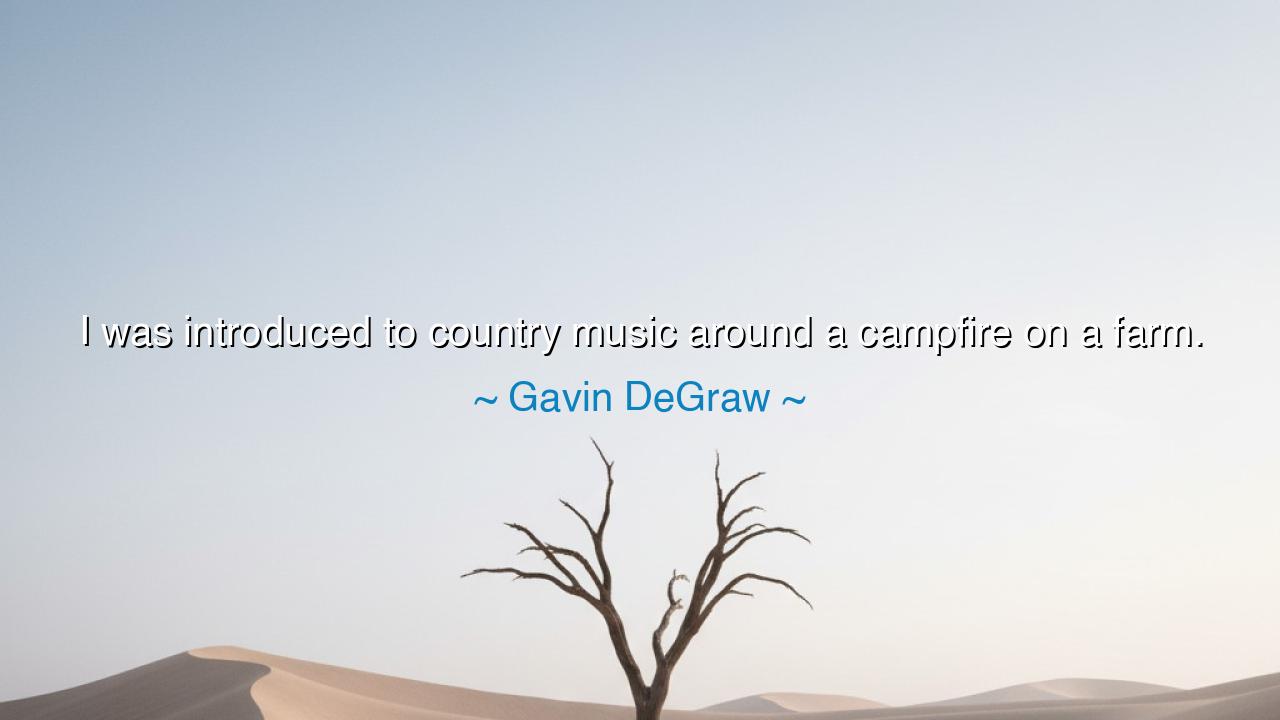
I was introduced to country music around a campfire on a farm.






Hear the words of Gavin DeGraw, who spoke with simplicity and remembrance: “I was introduced to country music around a campfire on a farm.” Though spoken gently, these words carry the depth of origin and the sacredness of beginnings. They are a reminder that music, at its heart, is not born in grand halls or glittering stages, but in the humble spaces where men and women gather close, warmed by fire and bound by story. To discover country music by a campfire is to encounter it where it is most alive: amidst the soil, the smoke, and the laughter of kin.
What is country music, if not the voice of the earth itself? It is the echo of boots upon the ground, the cry of fiddles beneath starlit skies, the tale of hardship and hope sung with honesty. Around a campfire, this music finds its truest form—not distant performance, but shared experience. Flames flicker, crickets sing, and men and women lift their voices together. In that circle, the divide between performer and listener dissolves. Music ceases to be entertainment and becomes communion, a ritual as old as humanity.
This truth is as ancient as civilization itself. In ages long past, before the written word, tribes gathered by fire to sing their stories. The campfire was both hearth and temple, the place where wisdom was preserved, where history was remembered, where courage was given through song. The songs of shepherds in the fields of Israel, the chants of Norsemen beneath the northern stars, the ballads of Celtic warriors before battle—all were first sung not in palaces, but in the open air, by the light of fire. DeGraw’s words connect us back to that eternal tradition: that music begins where hearts gather.
And what of the farm? It is the land of labor, the place where life is pulled from soil by sweat and faith. To discover music there is to understand that it does not belong to the distant or the elite, but to the people who work with their hands. Country music was born of such places—of farmers, ranchers, laborers—who sang of broken loves, long roads, and the hope of harvest. When DeGraw recalls his first encounter on a farm, he is speaking of music in its natural home, music woven into the daily lives of those who live close to the earth.
In history, too, we see this truth. Consider the African American spirituals sung by enslaved men and women in the fields. They did not sing in gilded houses, but in rows of crops, under sun and chain. And yet, their voices lifted beyond sorrow, creating music that carried strength, identity, and hope. Like country music, their songs were born in the soil, sustained by fire, and shared in circles of struggle. Music that springs from hardship carries a power that endures, because it comes not from luxury but from truth.
The wisdom here is clear: greatness often begins in the humble place. One may dream of grand stages, but the roots of art are found around the campfire, in the laughter of family, in the rough timbre of voices untrained yet sincere. To remember this is to remember that the essence of music—or any calling—is not in the applause of strangers, but in the firelit circle where it first touched your heart.
So let us take the lesson into our own lives: seek your beginnings, honor them, and never forget them. If you are an artist, remember where you first heard the spark of your calling. If you are a worker, remember the moments of unity that carried you through. Gather with others in simplicity—around a table, a fire, or even a shared silence—and let your voice rise. For it is in these humble beginnings that true strength is forged.
Thus, DeGraw’s words remind us of the eternal truth: that country music, and indeed all music, is at its core about connection—connection to land, to people, to memory, to spirit. And when we honor those beginnings, we ensure that our art, our work, our very lives remain authentic, rooted, and enduring.






AAdministratorAdministrator
Welcome, honored guests. Please leave a comment, we will respond soon